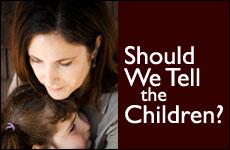 Iran’s Attack on Israel
Iran’s Attack on Israel


5 min read
Talking to your kids about the Connecticut school shooting.
“Did you tell your kids?”
That was the question on the lips of every parent I met in the days after the Newtown shooting. Some had shielded their kids at first and then explained what had happened when their children saw a headline or watched the news. Others had told their kids about the horrific murders before their kids heard about it from someone else. In some families, the kids themselves had brought up the topic, after hearing the news from friends.
My husband and I opted not to mention anything about the shooting to our young children. We didn’t turn on the news, and when the newspaper came I quickly whisked away the front page so my kids wouldn’t encounter it. Many of my friends thought we were being overly-protective, but I think our reluctance to mention the tragedy sprang from two very different – and very Jewish – values.
On one hand, I want my children to grow up with a sense that the world is a good place. It was hard enough for me to cope with the news, and I didn’t think my children would be able to hear the news without it making them suspicious and fearful. One day I want my children to know about it, but I was willing to delay that.
This debate made me realize that the way I look at my home is subtly different from the way some of my friends and neighbors do. During the two thousand years since our holy Temple in Jerusalem was destroyed, each individual Jewish home is a little “mini” Temple, a mikdash me’at. This concept has made me act consciously as a gate-keeper; I no longer necessarily allow every conversation that’s taking place in the public arena to enter our home.
Moreover, when they do learn about the shooting, I want to be ready, not shocked and teary as I was when I first heard about it. While we cannot control world events, we can decide how we respond to them. When the time comes to discuss Newtown, I hope to be able to channel my kids’ emotions into positive, constructive avenues such as donating charity, learning Torah, and praying in memory of the victims.
Dr. Samantha Bender, a Maryland-based child psychologist who has a experience working with at-risk children, agrees that young children are best shielded from extremely disturbing news. Increasing children’s stress levels can be painful, and if we’re going to do so, we should ask ourselves why and what we hope to accomplish. “Parents should ask themselves: does my desire to talk about this come from my own anxiety?”
If young children do find out about this or other catastrophes, Bender says, “It’s best to give them a sanitized version.” Keep descriptions very simple, and stress the positives in the situation. In the case of the Newtown shooting, this might be the heroism of the teachers, and the fact that the school officials’ actions saved the lives of over 600 children who were unhurt in this tragedy. And if we choose to tell our children, we also have to help them learn to put the news into perspective. “Point out that the media focuses on the worst case” when it’s in the news, Dr. Bender notes. Stress the fact that other schools around the country had a normal day.
One exception to this advice of being circumspect about the details of tragedies, Bender notes, is when events might impact children personally. In the case of Newtown, the shooter apparently suffered from Asperger’s Syndrome, and families of children with Asperger’s thus face a unique challenge. They need to prepare their kids for the fact that some people might judge them negatively after this tragedy. (For some families, too, this tragedy might serve as a reminder to ensure that kids with Asperger’s are not isolated socially, and that they’re getting help with social skills.)
If children do find out about tragedies, the American Academy of Pediatricians echoes this advice: keep discussions short, and stress the positive even in bad situations. They also recommend channeling kids’ emotions towards something positive too, such as giving charity or working to help victims. This helps to manage their anxiety, and gives them hope that the world still contains goodness.
It also echoes the Jewish view that one way to respond to difficulties is by challenging ourselves to find ways we can help. For children especially, who have a simplistic view of the world, responding to evil by doing good things helps preserve their belief in fairness. When the tragedy is far away, we can still help by doing good deeds in honor of the victims. We can also channel our impulse to help others closer to home, by finding people in our own communities who can use our support.
